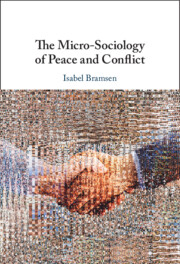‘Isabel Bramsen has more first-hand knowledge than almost anyone of uprisings, civil wars, and the practical business of peace-making. She also provides the most advanced version of interaction ritual theory, synthesized with a general theory of micro-sociology, and puts it to work explaining the flow of events along the spectrum of war and peace. Above all, she explains when and how people acquire social agency, the power to shape the turning points of history.’
Randall Collins - Author of Explosive Conflict: Time-Dynamics of Violence
‘This is a wonderful comparative exploration of the power of micro-dynamics in conflict-affected contexts. It helps us better understand the stickiness of conflict, but also how individuals, communities and elites can navigate their way through it. Bramsen convincingly makes the case that empathy and human social interactions matter. This is a career-defining book and is highly recommended.’
Roger Mac Ginty - Professor, School of Government and International Affairs, Durham University
‘In this remarkable book, Bramsen theorizes and empirically documents the political effects of microsociality in peace processes and world politics writ large. Her useful methodological innovations (especially video data analysis) and rich theoretical insights about the rhythm and script of everyday interaction open promising research avenues in international practice theory, peace and conflict studies, and beyond. Perhaps counterintuitively for some, the book shows that not only friendly but also conflictual interaction can be part of peace!’
Vincent Pouliot - James McGill Professor, Department of Political Science, McGill University
‘Isabel Bramsen eloquently weaves together traditional Peace and Conflict Research theories with recent thinking on corporeality, rhythm of interaction and emotional exchange. Her groundbreaking work not only develops a highly innovative analytical framework for studying conflict transformation but also offers a fascinating empirical analysis of how corporeal interactions work and develop in peace and conflict.’
Tarja Väyrynen - Professor, Tampere Peace Research Institute (TAPRI) and Vice-chair, Research Council for Culture and Society
‘… this work does two things exceptionally well: it provides a detailed description of micro-sociology theory and process in the context of social movements, and it operationalizes micro-sociological analysis through the use of visual data (photographic and video), illustrating their analytical usefulness in contexts such as the Arab Spring uprisings of 2011 and the Northern Ireland peace process … Highly recommended.’
S. P. Duffy
Source: CHOICE
‘Bramsen offers … strategies that will prove useful for students and researchers who adopt the micro-sociological approach to peace and conflict.’
Anastasia Shesterinina
Source: International Affairs



